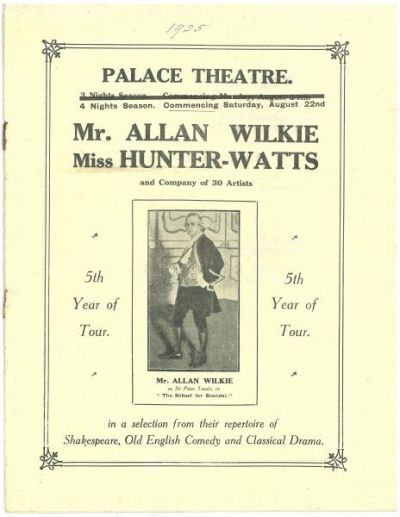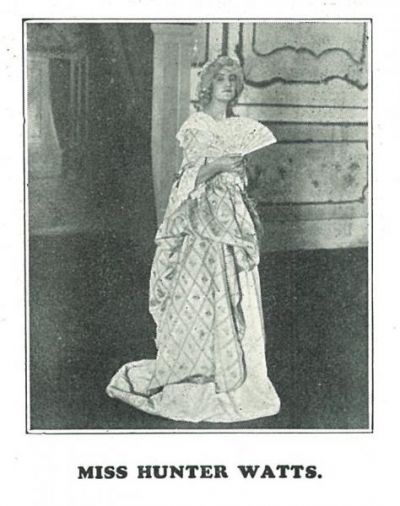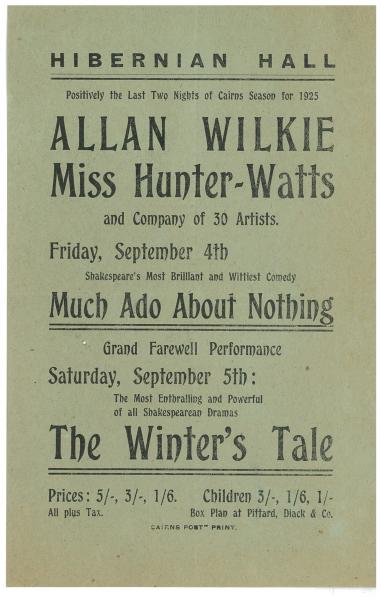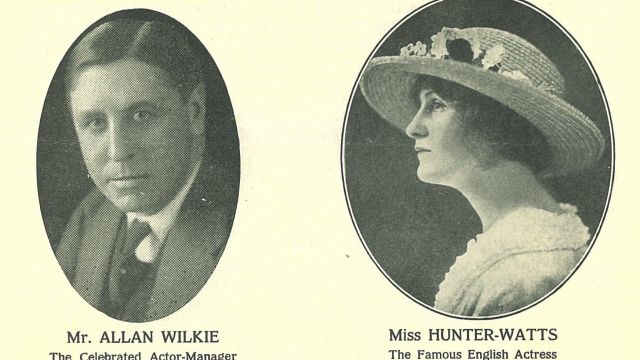All The World Was Cairns’ Stage.
A century ago, a railway strike stranded a troupe of actors in North Queensland, providing locals with an unexpected festival. Seaborn, Broughton & Walford Foundation Archivist Susan Mills recounts the exploits of Australia’s first national touring Shakespearean company.
Tales of enterprise and resilience can be found within material persevered in archives. One such tale is the Allan Wilkie Shakespearean Company and their determination to bring Shakespeare to all of Australia in the 1920s, despite roadblocks along the way.
Allan Wilkie was born in 1878 in Liverpool, the son of an engineer. As a young man, he left his job in a merchant office to move to London with the aim to become a Shakespearean actor. In 1899, he made his debut as an extra on the Comedy Theatre stage in London and worked his way up to roles with the likes of the deliciously named flamboyant actor and theatre manager Herbert Beerbohm Tree.

In 1905, Wilkie founded his own company, touring throughout England, India, Asia and South Africa. In 1909, he had married an actress in the company, Frediswyde Hunter-Watts. When World War I broke out, the pair travelled to Australia in 1915, where Hunter-Watts’ uncle had a farm in New South Wales.
Australian theatrical entrepreneur George Marlow invited the pair to head a Shakespearean company in Australia - the Grand Shakespearean Company. The season opened at the Princess Theatre in January of 1916, with The Merchant of Venice, followed by Hamlet, Othello and Romeo and Juliet.
Ticket prices were kept low, and school pupils were encouraged to attend. Its success led to a national tour and quicky established Wilkie and Hunter-Watts as the leading actors of Shakespeare in Australia.
In an interview with the publication Table Talk in 1916, Allan Wilkie said, “It seems to me there should be support here for a permanent Shakespearean company, such as they have in England all year round. Not pretentious productions with big star companies, but adequate productions with experienced artists.”

It was in 1920 that Wilkie made this dream come true, as he launched the Allan Wilkie Shakespearian Company. Miss Hunter-Watts was the leading actress. The non-superstitious Wilkie opened in September of that year with Macbeth in Melbourne. The stage settings were minimal, and, in an interview at the time, he explained that streamlined staging shortened interval times, allowing more of the play to be included. His stated aim for the company was to eventually stage all of Shakespeare’s plays.
In 1925, there was a change in the repertoire, with the inclusion of old English comedy and classical English drama. That year the tour started its Queensland leg in Brisbane at the Theatre Royal, before making its way up the eastern seaboard. The company started their 4-night run at the Palace Theatre in Cairns with She Stoops to Conquer (Oliver Goldsmith’s 1773 comedy), followed by The School for Scandal (a 1777 comedy of manners by Richard Brinsley Sheridan), The Taming of the Shrew, and The Rivals (another comedy of manners by Richard Brinsley Sheridan, 1775).
Plans were thrown off track when a railway strike in northern Queensland was called, stranding the company of 30 artists. The Cairns Post announced “one of the indirect advantages to Cairns of the present railway strike” was an unexpected extended season of Shakespeare for the inhabitants of Cairns, with reduced prices “to meet the prevailing conditions”. On a sidenote, the newspapers added, Mr Wilkie and Miss Hunter-Watts had arrived in Cairns from Townsville with only their handbags, so had to buy complete outfits.

The unexpected Shakespeare season moved to Cairns’ Hibernian Hall with The Bells (Leopold David Lewis’s 1871 drama) on Saturday 29 August, which was then followed by a veritable Shakespeare festival - A Midsummer Night’s Dream on the Tuesday, Twelfth Night on Wednesday, The Merchant of Venice on Thursday, Much Ado About Nothing on Friday, and The Winter’s Tale on Saturday.
Such was the predicament, two company members walked along the railway line from Cairns to the isolated mountain town of Kuranda to assist communications.
However, the consequence of being stranded was the cancellation of further Queensland tour dates and, ultimately, the loss of money for the company. The fortunes of Allan Wilkie Shakespearean Company continued to wax and wane, for in the following year a fire destroyed the company’s sets and costumes in Geelong. However, a subsequent public appeal raised almost £3000.
Sadly, 1930 saw the demise of the Allan Wilkie Shakespearean Company due to the Depression and the rise of the talkies. Since its inception, Wilkie and Hunter-Watts and their company of travelling actors, many Australian, had continually toured Shakespeare all over Australia, and had staged 27 out of Shakespeare’s 37 plays. Their influence on the Australian public and theatre is felt to this day.

